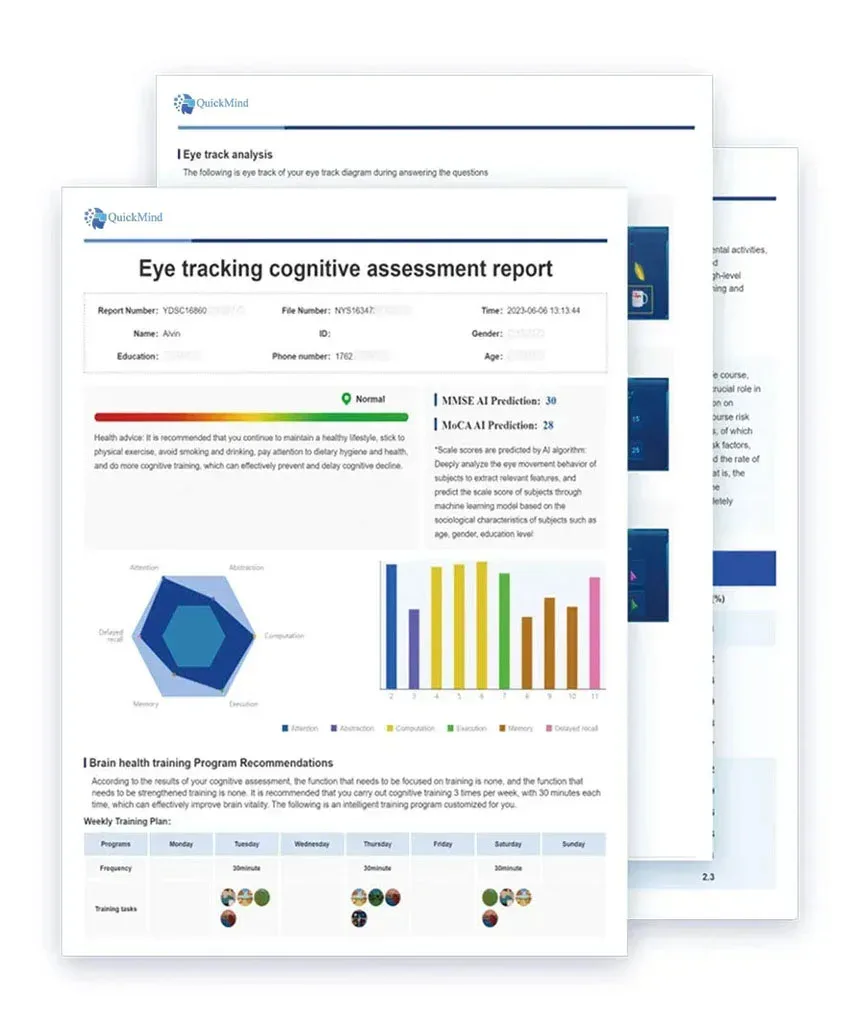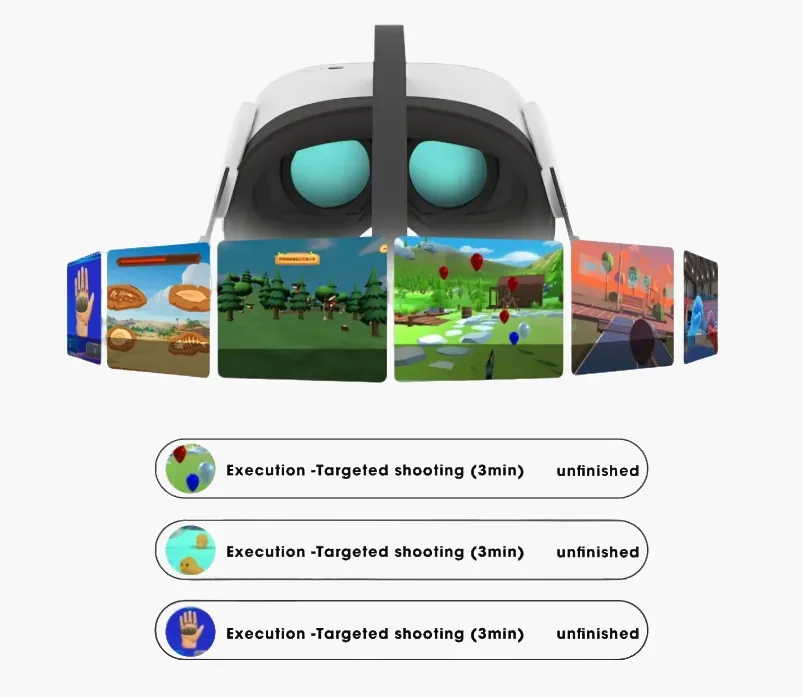
Increasing examinations implies that interactive virtual spaces program can significantly boost the health of persons experiencing cognitive decline. By shifting them to serene scenes, VR provides a distinctive opportunity for brain engagement, sentimental adjustment, and group participation. A variety of examinations have indicated that VR therapy can lower uneasiness, anxiety, and low mood in dementia subjects while also augmenting their remembrance, focus, and linguistic talents.
- VR provides persons with dementia to relive dear memories through participative simulations.
- In addition, it can offer a risk-free and helpful space for collective interaction, cultivating a realization of relationship and adherence.
- Specialists maintain that VR therapy has the possibility to overhaul dementia care by delivering new and cutting-edge methods to confront the hard issues faced by users diagnosed with this affliction.
Electronic Health Solutions for Mental Boosting in Alzheimer's
Growing computerized methods are revealing effectiveness in the territory of mental improvement for patients experiencing Alzheimer syndrome. These systems capitalize on software solutions to strengthen brain performance and likely delay the spread of the health issue. Gamified drills, personalized mentoring, and neuropsychological training are some samples of approaches being researched in this emerging area. While investigations are progressing, digital therapeutics provide a potential option for improving the health of those experiencing cognitive Alzheimer's illness.Addressing Alzheimer's with Virtual Territory Journeys
Pertaining to persons battling cognitive Alzheimer's ailment, the incremental waning of remembrance and cognitive abilities can drastically weaken their aptitude to engage with the external setting. This impairing disease often produces in seclusion, displeasure, and a lowered personal identity. Contemporary progresses in virtual reality technology unveil a pioneering option to mitigate these barriers by formulating immersive scenarios that can encourage the brain and rekindle cognitive function.
Computer-generated surroundings created specifically for patients diagnosed with Alzheimer's can convey them in acquainted surroundings, such as their childhood abode or a chosen recreational spot, triggering positive memories and lowering anxiety. Through interactive tasks, these virtual settings can also promote cognitive abilities like cognition, alertness, and critical thinking.
The likely improvements of virtual reality in Alzheimer's therapy are considerable. Early evaluations have proved constructive results, with subjects exhibiting improvements in cognitive operation, mood, and overall quality of life. As this innovation proceeds, it holds the key to revolutionizing the way we approach Alzheimer's disease, making available a new pathway for help and reinforcement.
Virtual Memory Therapy for Alzheimer's Clients
Reminiscence therapy is a broadly accepted technique used to improve cognitive function and affective health in individuals with Alzheimer's disease. This conventional form of therapy involves eliciting patients to retrieve past experiences, often through interchange. However, a innovative approach is emerging: VR-mediated reminiscence therapy.
This immersive innovation utilizes virtual reality headsets to bring patients in virtualized environments that invoke memories from their past. By immersing in these man-made contexts, individuals with Alzheimer's can connect with their past in a influential way.
The Potential of Virtual Reality to Improve Memory and Cognition in Dementia
Virtual reality (VR) is emerging as a hopeful mechanism in the fight against dementia, affording trailblazing ways to activate memory and cognition. By crafting immersive realities, VR can support individuals with dementia reexperience memories, join in meaningful activities, and augment cognitive competencies. Studies have established that VR interventions can bring about marked improvements in memory recall, attention, and locational awareness. Moreover, VR provides a harmless and motivating space for individuals with dementia to share, reducing feelings of isolation and worry.
- Additionally, VR can be configured to individual needs and preferences, supporting increased levels of participation.
- Despite the chances of VR, extended research is needed to fully understand its long-term impact in dementia care.
Recovering Recall and Connections: Virtual Reality's Social Benefits in Alzheimer's
Immersive immersion technology is emerging as a state-of-the-art tool in the sector of dementia care. By crafting participatory and collaborative realities, VR has the ability to spark memories, promote social interaction, and enhance the overall quality of life for users diagnosed with Alzheimer's. Especially an important remarkable aspects of VR is its ability to relocate users to classic dementia scenes and journeys from their past. Whether it's a visit to a childhood home or a model of a beloved holiday, these virtual explorations can evoke happy memories and bolster cognitive power. Furthermore, VR can advance social interaction by uniting individuals with others who share similar interests. This can be particularly useful for people with Alzheimer's who may experience challenges with traditional social connection. By developing a safe and compelling virtual space, VR can soothe feelings of isolation and loneliness, which are common among users struggling with Alzheimer's. Overall, VR holds immense capacity for remodeling the lives of clients with Alzheimer's by resurrecting memories, strengthening connections, and enhancing their quality of life. As technology evolves to expand, we can expect even more novel applications of VR in the field of dementia care.Exploiting Cognitive Training: Utilizing VR for Alzheimer's Symptom Management
Digital virtual environments is rapidly emerging as a revolutionary tool in the realm of cognitive training, particularly for persons managing Alzheimer's disease. By immersing patients in interactive and engaging virtual environments, VR-based interventions can stimulate cognitive functions such as memory, attention, and problem-solving. These games usually incorporate elements of storytelling, exploration, and social interaction, making the training process significantly appealing. Studies have shown that VR-based cognitive training can lead to marked improvements in cognitive performance, likely delaying the progression of Alzheimer's symptoms. Moreover, VR provides a safe and controlled environment for patients to practice new skills and reinforce their confidence.
- Interactive gaming in VR training can make it very enjoyable and involving for patients with memory problems.
- VR simulations can offer authentic scenarios that challenge and stimulate cognitive functions.
- Personalized VR experiences can cater to special tastes and systems.
Virtual Reality: New Horizons in Dementia Assistance
Captivating artificial domains offer a modern and favorable avenue for people affected by dementia. These systems can simulate familiar environments, allowing those affected by cognitive decline to revisit cherished memories and encourage a sense of familiarity. By reducing the effects of dementia, VR spaces have the capability to enhance quality of life for both clients and their helpers.
- Examinations indicate that VR methods can effectively impact cognitive function, emotional well-being, and even locomotor abilities in individuals with dementia.
- Moreover, VR creates a safe and regulated environment for engagement, reducing the risk of stress.
- What is more, VR can encourage social connections by allowing individuals with dementia to collaborate in cyber activities with others.
Leveraging VR for Timely Alzheimer's Diagnosis and Care
Alzheimer disorder presents a elaborate issue, often being latent in its early stages. Nonetheless, virtual reality (VR) is becoming prominent as a innovative tool for early detection. Through immersive platforms, VR can analyze cognitive performance in ways that traditional methods fail to. This possibility allows for prompt management strategies, potentially impeding disease progression and optimizing the quality of life for subjects with Alzheimer's.
- VR cognitive tests measure recall, alertness, and positional skills in safe and regulated spaces.
- Specialized virtual sessions support personalized cognitive engagement for users.
- Computer-generated spaces provide social conditions for Alzheimer's clients to bond and mingle.
Facilitating Dementia Communication and Interaction Through VR
{In the realm of dementia care, innovative technologies are emerging to supplement the lives of subjects facing dementia challenges. Virtual reality (VR) is one such resource that holds immense capacity for bridging the communication and interaction gap often experienced by those with dementia. By developing compelling digital realities, VR can activate cognitive function, reduce behavioral issues, and ultimately improve the overall well-being of people living with dementia.
VR experiences tailored to dementia care can range from recollection therapy sessions that guide clients through remembered environments, to interactive games that promote social interaction and cognitive engagement. Furthermore, VR has the ability to connect individuals with dementia to their loved ones, regardless of physical remoteness, fostering a sense of community.
- VR can empower in reducing agitation and anxiety by providing a calming and absorbing environment.
- Analyses have shown that VR interventions can lead to improvements in cognitive function, mood, and social interaction in subjects coping with dementia.
- As technology continues to progress, we can expect even more innovative and successful
